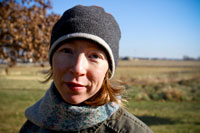If I were to sum up my take on writing in one, tidy, six-word definition, I’d call it: the creative expression of an idea. I’m a storyteller at heart, and one of the great truisms I’ve come to accept over my development as writer is that few, if any, stories are wholly new. It’s how you organize the pieces, the details you convey, the climax at which you arrive, and the words you choose that make it your story. And oftentimes, its commonalities your stories and those of others that make them most appealing.
I am not a poet by trade, but have an on-again-off-again love affair with the form—its capacity for communicating mood, the way in which it demands from the poet an economy of words and a sharpening of imagery. Most importantly, though my instincts lead me toward narrative, I’ve found that poetry pushes me to slow down, focus on a moment, and flesh it out until it’s actualized on the page.
And so, for me, the poem starts with a moment—the squeal of a bedspring, the sight of chalk drawings on a basketball court—and expands to what came before, what came after, or what layers exist within that very moment. It’s my job to unpack that moment the best I can, and I’m done when the story of that moment has been fully realized.
Michael Chin writes and manages content for The A Cappella Blog – www.acappellablog.com.



 RSS Feed
RSS Feed